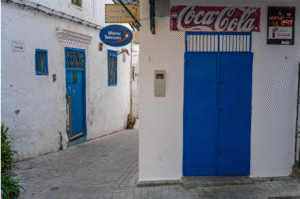Remote work has unlocked a world of possibilities for those who seek to balance their careers with a sense of adventure and exploration. As technology enables us to work from anywhere, travel has become less about rigid schedules and more about discovery and connection. This evolution in travel preferences is prompting industries to adapt, offering new opportunities for destinations and travel-related businesses to cater to this dynamic market. The world is opening up in unprecedented ways, allowing travelers to redefine what it means to explore and engage with the world around them.
The traditional paradigm of business travel, characterized by brief, hectic trips centered around conferences and meetings, is giving way to a more nuanced approach. With the rise of remote work, business travel is evolving into a blend of professional obligations and personal exploration, often extending beyond the confines of the typical Monday-to-Friday itinerary. This shift reflects a broader cultural change in how we value time and experiences, with many professionals seeking to maximize their trips by incorporating elements of leisure and relaxation.
Trends in Business Travel

The modern business traveler is no longer content with merely ticking destinations off a list. Instead, there is a growing desire for travel experiences that are both productive and personally enriching. This shift is reflected in recent business travel statistics, which indicate a marked increase in longer stays and the incorporation of leisure activities into business trips. According to a study by the Global Business Travel Association, nearly 40% of business trips now include a leisure component, a trend that is expected to grow as remote work becomes more ingrained in corporate culture. This change is driven by a desire for deeper engagement with destinations, allowing travelers to immerse themselves in local culture while fulfilling their professional duties.
Moreover, companies are recognizing the benefits of this approach, noting improvements in employee satisfaction and productivity when travel includes leisure elements. By supporting bleisure travel, companies not only enhance the well-being of their employees but also foster a more innovative and motivated workforce. The blending of business and leisure travel is reshaping corporate travel policies and encouraging businesses to think creatively about how to support their teams in a remote work environment.
The Rise of ‘Bleisure’ Travel
Bleisure travel—a portmanteau of business and leisure—has become a defining feature of the new travel landscape. This trend not only enhances the travel experience but also fosters a deeper connection with the destination. For travel agents, this presents an opportunity to craft itineraries that seamlessly integrate work and play, offering clients a chance to engage with local cultures and communities in meaningful ways. By designing experiences that cater to both professional and personal interests, travel agents can create memorable journeys that resonate on multiple levels.
The rise of bleisure travel reflects a shift in how travelers prioritize their time and experiences. As the lines between work and leisure blur, individuals are seeking more holistic and balanced travel experiences. This presents an opportunity for the travel industry to innovate and offer bespoke services that cater to the evolving needs of modern travelers. By understanding the motivations behind bleisure travel, businesses can create offerings that enhance both the professional and personal aspects of travel, ultimately leading to more satisfied and engaged clients.
The Impact of Remote Work on Travel Destinations
Remote work has also transformed the destinations we choose to visit. With the world as our office, traditional business hubs are no longer the sole focus for corporate travel. Instead, remote workers are seeking out destinations that offer a balance of connectivity, comfort, and cultural richness. This shift is reshaping the travel industry, encouraging destinations to adapt and cater to the needs of remote professionals seeking unique and enriching environments.
Hidden Gems and Emerging Destinations
The allure of remote, lesser-known locations is stronger than ever. These hidden gems offer a respite from the hustle and bustle of urban life, providing travelers with the space to unwind and the time to immerse themselves in local traditions. For hotel managers, this shift underscores the importance of highlighting a property’s unique attributes and its connection to the local community. By emphasizing authentic experiences and storytelling, hotels can appeal to travelers seeking more than just a place to stay. These destinations offer an opportunity to experience the world in a more intimate and personalized way, often leading to more meaningful and memorable travel experiences.
Moreover, as travelers seek out these hidden gems, there is a growing emphasis on sustainable and responsible tourism practices. Travelers are increasingly aware of their impact on the environment and local communities, leading to a demand for experiences that are not only enriching but also conscientious. This trend presents an opportunity for destinations to highlight their commitment to sustainability and community engagement, attracting travelers who value ethical and responsible travel options.
The Role of Technology
Technology plays a crucial role in facilitating this new wave of travel. With reliable internet access and digital tools, remote workers can maintain productivity from virtually anywhere. This technological capability has opened up a world of possibilities, allowing travelers to explore destinations that were previously off the beaten path while still meeting professional commitments. The ability to work remotely has revolutionized the way we travel, enabling us to balance our professional and personal lives in innovative ways.
The integration of technology into travel experiences also enhances the overall quality of the journey. From booking accommodations to navigating new cities, digital tools provide travelers with the resources they need to make informed decisions and maximize their experiences. As technology continues to evolve, it will play an increasingly important role in shaping the future of travel, offering new ways to connect, explore, and engage with the world around us.
Crafting Meaningful Travel Experiences
For lifestyle influencers and travel agents alike, the challenge lies in curating experiences that resonate on a deeper level. In a world where travel content is abundant, standing out requires a focus on authenticity and storytelling. By showcasing serene, understated luxury and fostering genuine connections with local cultures, influencers can captivate their audiences and inspire them to embark on their own journeys of discovery. This approach not only enriches the travel experience but also builds lasting relationships between travelers and the destinations they visit.
Emphasizing Authentic Connections
Creating content that highlights cultural immersion and local context is key to engaging discerning travelers. This might involve participating in traditional ceremonies, exploring local cuisine, or collaborating with community artisans. Such experiences not only enrich the travel narrative but also foster a sense of connection and understanding between travelers and their destinations. By highlighting these authentic connections, travel professionals can offer experiences that are both meaningful and transformative, encouraging travelers to see the world through new perspectives.
Moreover, the emphasis on authenticity extends beyond the travel experience itself. Travelers are increasingly seeking out brands and businesses that align with their values, opting for experiences that are sustainable, ethical, and community-focused. This trend presents an opportunity for the travel industry to innovate and offer products and services that resonate with the values of modern travelers, ultimately leading to more meaningful and lasting connections.
Curated Itineraries for the Discerning Traveler
For travel agents, this is an opportunity to design bespoke itineraries that cater to clients’ desires for meaningful experiences. Whether it’s arranging a private tour of a historic site or organizing a hands-on workshop with local craftsmen, the goal is to provide travelers with opportunities to engage with their surroundings in authentic and memorable ways. By offering personalized and curated experiences, travel agents can create journeys that are both enriching and unforgettable.
The demand for curated itineraries reflects a broader trend toward personalized travel experiences. As travelers seek out unique and tailored journeys, the travel industry has an opportunity to innovate and offer services that cater to these evolving preferences. By understanding the needs and desires of modern travelers, businesses can create experiences that are both impactful and transformative, ultimately leading to a more engaged and satisfied clientele.
The Future of Travel in a Remote Work World
As remote work continues to shape the travel landscape, the emphasis on time, space, and local context will only become more pronounced. This shift presents a unique opportunity for travel professionals to redefine what it means to experience a destination, moving beyond mere sightseeing to foster genuine connections and lasting memories. The future of travel is bright, with endless possibilities for innovation and growth, as the industry adapts to the changing needs and preferences of modern travelers.
Sustainable and Responsible Travel
In the wake of this transformation, the importance of sustainable and responsible travel cannot be overstated. As travelers seek out unique experiences, there is an increased awareness of the need to protect and preserve the environments and communities they visit. By advocating for responsible travel practices, the industry can ensure that future generations will continue to enjoy the world’s hidden gems. This shift towards sustainability reflects a broader cultural change, as individuals and businesses alike recognize the importance of protecting the planet and its resources.
The emphasis on sustainable travel also presents an opportunity for the industry to innovate and offer products and services that align with the values of modern travelers. From eco-friendly accommodations to community-based tourism initiatives, there are countless ways for businesses to engage with this trend and offer meaningful experiences that are both enriching and responsible. By embracing sustainability, the travel industry can create a more ethical and inclusive future for travelers and destinations alike.
Embracing Change and Innovation
The future of travel is bright, with endless possibilities for innovation and growth. By embracing the changes brought about by remote work, travel professionals can lead the way in crafting experiences that are both enriching and transformative. Whether through the lens of business travel trends, corporate travel statistics, or the allure of undiscovered destinations, the journey ahead promises to be one of discovery, connection, and unparalleled adventure. As the industry continues to evolve, there will be new opportunities to engage with travelers in innovative ways, offering experiences that are both personalized and impactful.
In conclusion, as remote work becomes the norm, the world of travel is poised for a renaissance. By prioritizing authenticity, connection, and sustainability, travelers and industry professionals alike can look forward to a future where travel is not just about the destination, but about the journey and the experiences that define it. This new era of travel offers endless possibilities for exploration and discovery, as individuals and businesses alike embrace the transformative power of travel in a remote work world.



